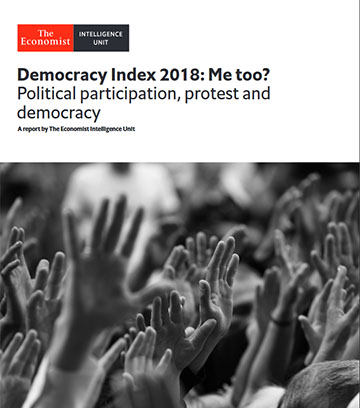Guyana is listed as a “flawed democracy” in the latest Economist Intelligence Unit (EIU) Democracy Index, which considers a number of rankings across different areas, including the electoral process and pluralism, the functioning of government, political participation, political culture and civil liberties.
The Democracy Index provides a snapshot of the state of democracy worldwide for 165 independent states and two territories in 2018. It covers almost the entire population of the world and the vast majority of the world’s states (microstates are excluded). The EIU is the research and analysis division of The Economist Group, the sister company to The Economist newspaper.
According to the report on the index, based on its scores on a range of indicators within these categories, each country is then itself classified as one of four types of regimes: “full democracy,” “flawed democracy,” “hybrid regime” and “authoritarian regime.”
The report states that 20 countries have full democracies; 55 have flawed democracies; 39 have hybrid regimes; and 55 authoritarian regimes.
Countries that fall in the “flawed democracy” category are those that have free and fair elections and, even if there are problems (such as infringements on media freedom), basic civil liberties are respected. However, there are significant weaknesses in other aspects of democracy, including problems in governance, an underdeveloped political culture and low levels of political participation.
Globally, Guyana is ranked at number 54, however, in the Latin America and the Caribbean region, it is ranked number 11, with an overall score of 6.67 out of a possible 10. Other Caribbean countries listed, inclusive of Jamaica, Trinidad and Suriname, were also listed in the “flawed democracy” category, while Haiti was under the hybrid regime category.
Guyana’s lowest score was 5.00 in the area of political culture, while its highest score of 9.17 was for electoral process and pluralism. Under functioning of the government, the country was scored at 5.71, while political participation saw a 6.11 score and civil liberties a 7.35 score.
The latest index is the 11th edition since 2006. This year’s results are mixed and for the first time in three years, the global score for democracy remained stable.
“This result disguises some movement across regions and across categories. One country, Costa Rica, moved from a flawed democracy to a full democracy; at the other end of the spectrum, one country, Nicaragua, moved from flawed regime to authoritarian regime,” the report said.
A total of 42 countries experienced a decline in their total score compared with 2017; 48 registered an increase in total score. The report added that as a percentage of the world’s population, fewer people lived in some form of democracy (47.7%, compared with 49.3% in 2017). Very few of these (4.5%) were classified as living in a full democracy. Just over one-third of the population lived under authoritarian rule, with a large share represented by China.
Norway, with an overall score of 9.87, Iceland, with a score of 9.58, Sweden, with a score of 9.39, New Zealand with a score of 9.26 and Denmark with a score of 9.22 are the five highest ranked countries on the index. The bottom five countries are Chad (1.61), Central African Republic (1.52), the Democratic Republic of Congo (1.49), Syria (1.43) and North Korea 1.08.






